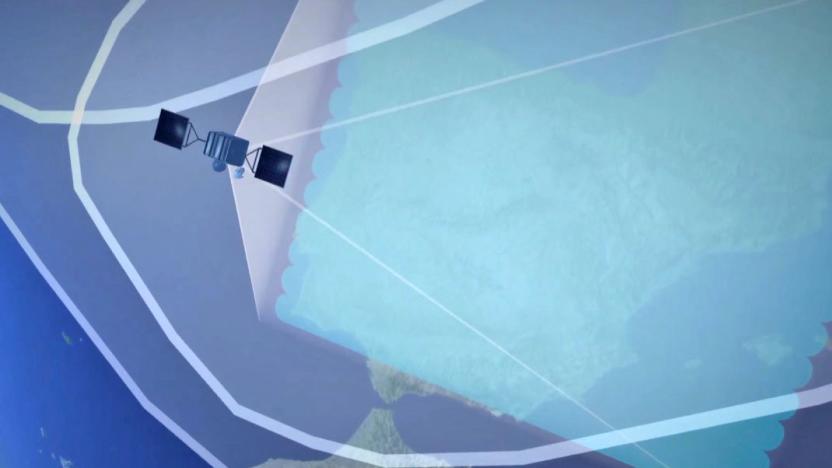SatelliteInternet
Latest

Watch OneWeb launch its first 5G satellites into space at 4:37PM ET
After a number of delays, US-based communications company OneWeb is finally ready to launch its first batch of satellites that will provide internet access to rural regions around the world. The company's first launch will take place Wednesday when a Soyuz rocket operated by Arianespace blasts off from the Guiana Space Center carrying six OneWeb satellites. The launch is set to take place at 1:37PM PT/4:37PM ET and will be livestreamed on OneWeb's website or on Arianespace's YouTube channel.
AJ Dellinger02.27.2019
Telesat inks satellite internet deals with Loon and Blue Origin
Canadian telecom Telesat has inked a couple of deals that could boost its aim to become a key player in the satellite internet field. It's planning to establish a low-earth orbit network of 292 satellites, with Jeff Bezos' Blue Origin helping to deploy them. Telesat will also use Alphabet-owned Loon's networking system to make sure the satellites work in harmony.
Kris Holt01.31.2019
Russia balks at US-run OneWeb satellite internet over security concerns
Russia's Federal Security Service (FSB) has thrown a wrench in a planned deal that would bring internet access to the most rural and remote parts of the country, according to Reuters. United States-based startup OneWeb was set to launch a satellite project that would provide an internet network for Russia, but the plans have been delayed over the FSB's concerns that the company will gather intelligence and threaten the country's national security.
AJ Dellinger10.24.2018
Facebook hopes to launch an internet satellite in early 2019
Facebook has cooperated on internet satellite initiatives (with less-than-ideal results), but there's been precious little word of plans to make its own satellite beyond high-level promises. Now, however, there's something tangible. Both publicly disclosed FCC emails and a direct confirmation to Wired have revealed that Facebook aims to launch an internally developed satellite, Athena, sometime in early 2019. A spokesperson didn't share details, but the shell organization Facebook used to keep filings hidden (PointView Tech LLC) talked about offering broadband to "unserved and underserved" areas with a low Earth orbit satellite on a "limited duration" mission.
Jon Fingas07.21.2018
Spirit is first budget airline in the US to offer WiFi
As a rule, traveling with a budget airline in the US means foregoing any kind of mid-flight WiFi access. Not so with Spirit, though. The no-frills air carrier is rolling out internet access to its aircraft this fall, with the entire fleet expected to have connectivity by summer 2019. It might even be usable, unlike some options -- Spirit is relying on Ka-band satellite access, and is promising another speed upgrade when the SES-17 satellite reaches orbit in 2021.
Jon Fingas05.11.2018
Viasat touts fastest satellite internet in the US with new service
Today, communications company Viasat debuted the fastest satellite internet available in the US -- up to 100 megabits per second. It's thanks to the Via-Sat 2 satellite system, which serves North America, Central America, the Caribbean and a small part of northern South America. Viasat is now also offering tiered unlimited data plans, from 12 to 30 megabits per second. The plans top out at $150 per month during the promotional period.
Swapna Krishna02.27.2018
SpaceX delays its satellite internet launch to February 21st
Sorry, folks, you'll have to wait a while longer before SpaceX's satellite internet launch takes place. With hours to go, SpaceX has delayed the liftoff from its February 17th target to 9:17AM Eastern on February 21st. According to the company, the crew at the Vandenberg launchpad needed extra time to run "final checkouts" of the upgraded fairing used to protect the Falcon 9 rocket's payload. The company has been inching toward completely reusable rockets, and it wants to be sure it's making progress on that front.
Jon Fingas02.18.2018
Quika promises free satellite internet for developing countries
Facebook's plans for free satellite internet access may have run into some... setbacks, but another company is promising to make that ubiquitous data a practical reality. Quika, a company led by the chief of satellite provider Talia, is launching a free satellite broadband service in the second quarter of 2018. It's promising speedy, low-latency Ka-band data in developing countries where income inequality and a lack of infrastructure (especially in rural areas) make conventional internet access impractical for most. Service will begin with Afghanistan, Iraq and most of Africa, but there are promises of more countries afterward.
Jon Fingas01.15.2018
FCC greenlights OneWeb to deliver satellite internet in the US
Providing internet to remote users beyond the telecom grid has always been a difficult dream to realize. But as Trump assured supporters in Iowa yesterday that better rural broadband would get looped into his infrastructure plans, the ambition at least has the White House's attention. Actual beyond-the-grid solutions have been varied and still, alas, experimental. A company working to support that population with a novel network of internet-beaming satellites, OneWeb, just hit an important milestone: The FCC has approved its request to broadcast internet on certain frequencies, giving it access to the US market.
David Lumb06.23.2017
JetBlue will have free satellite WiFi on every flight by fall 2016
JetBlue's plans to outfit its aircraft with fast satellite WiFi are most definitely on track. The airline has announced that it not only has Fly-Fi on all of its Airbus aircraft, but that it expects to have the free internet access aboard all its remaining flights by fall 2016. That's a big deal, particularly if you're a frequent flier -- it guarantees at least one carrier that will have relatively brisk (20Mbps per device) connections on every trip, whether it's a short hop or cross-country. JetBlue no doubt hopes that you'll use its expanding service to buy a few things, but it's hard to be too cynical about the company's motives when some other airlines charge you for WiFi that's virtually unusable.
Jon Fingas10.14.2015
Virgin's new in-flight WiFi is strong enough to stream video
Virgin America has announced that it's teaming up with satellite internet company ViaSat to provide the fastest in-flight WiFi of any commercial carrier. The new system uses a hybrid Ku-/Ka-band receiver to deliver an internet pipeline eight to 10 times faster than anything else on the market. The Ka-band alone offers a whopping 140 gigabits-per-second throughput. It's being installed on the company's new fleet of A320 airliners and will be put into service on Hawaii-bound routes starting next year. That alone is a big accomplishment as the rest of the airline's fleet have to rely on ground-based WiFi connections, which don't work over the ocean's expanse. Virgin touts that this in-flight connection will be equivalent to an average home broadband link and users are expected to use it as such, streaming videos, watching the carrier's 18 channels of DishNetwork and surfing the internet with abandon -- just at 35,000 feet.
Andrew Tarantola07.07.2015
ViaSat adds 'virtually unlimited' Freedom satellite internet plan for $70 per month
It didn't happen overnight, but ViaSat's finally on its way to transforming the satellite internet space, be it through speedy in-flight WiFi on JetBlue and United or the Exede residential service. That latter product, while the fastest internet option for customers without access to cable or fiber, isn't without its critics, due in no small part to some rather prohibitive monthly data caps. Well, no more. The company's new Freedom plan, available beginning August 18th for $70 per month (or $60 when bundled with phone service), delivers "virtually unlimited" access for streaming, web browsing and anything else you might plan to do. Officially, there's a monthly cap of 150 GB, but ViaSat likely won't enforce that limit. Of course, Exede still won't be a fit for downloading terabytes of video or linking up your remote server farm, but if you plan to do some work during the day and stream an HD movie each night, you should be good to go.
Zach Honig08.12.2014
In-flight WiFi to be available across Europe by 2017
In-flight internet is readily available across the US, but that type of connectivity is almost unheard of in Europe. Regulators are coming 'round to the idea, and seeing an untapped opportunity, Inmarsat has announced its grand plan to create an EU-wide network for getting air travelers online. The satellite company is partnering with 4G providers to build an air-to-ground network that'll handle the data traffic, in the same way Gogo (and soon AT&T) provides in-flight WiFi in the US. A newly built satellite called Europasat will also provide support from above, making sure the connection stays constant as a plane pairs with different cell towers along its path.
Jamie Rigg06.05.2014
Instant Wild satellite cameras protect animals through crowdsourcing (video)
Remote cameras are useful to wildlife conservationists, but their closed (or non-existent) networking limits the opportunities for tracking animals around the clock. The Instant Wild project's cameras, however, are designed to rely on the internet for help. Whenever they detect movement, they deliver imagery to the public through Iridium's satellite network. Anyone watching the cameras through the Instant Wild iOS app or website becomes an impromptu zoologist; viewers can identify both animals and poachers that dedicated staff might miss. Maintenance also isn't much of an issue, as each unit is based on a Raspberry Pi computer that can run for long periods on a single battery. The Zoological Society of London currently operates these satellite cameras in Kenya, but there are plans underway to expand their use to the Antarctica, the Himalayas, Indonesia and Sri Lanka.
Jon Fingas09.07.2013
O3b to launch first 4 satellites, start providing internet connection in remote areas
It's been a few years since we've heard about O3b's mission to provide affordable internet access where it's not currently available, and for a while we thought we'd never see it happen. Thankfully, the company's plans didn't fall by the wayside: O3b is finally slated to launch its first four satellites on June 24, with the next four shooting into orbit sometime in September. The company aims to send a total of 16 medium-earth orbit (MEO) satellites to space that small ISPs in Latin America, the Middle East, Asia, Australia, and Africa can tap into. Once they're operational, O3b claims the previously unconnected can experience max download speeds of up to 1.2Gbps, giving Google Fiber a run for its money. The satellites will begin their journey from French Guiana, but you don't need to fly there to be part of the event -- just kick back and monitor it live online via Ariane Space. [Thanks, Vicki]
Mariella Moon06.05.2013
ViaSat snags Guinness World Record for highest-capacity satellite
After earning top marks from the FCC for its broadband performance, ViaSat has added yet another feather to its cap in the form of a Guinness World Record. According to the august organization, the ViaSat-1 satellite, which powers the 12 Mbps Exede Internet service, is the highest-capacity communications satellite in the world. The reason for the accolade? The orbiting spacecraft apparently provides around 100 times the throughput capacity of a Ku-band satellite and ten times that of a Ka-band, which adds up to more capacity than all North American communication satellites combined at the time of its 2011 launch. While its broadband service still has latency issues, the folks over at ViaSat must feel pretty confident of its recent accomplishments; the company is currently looking beyond its rural customer base and venturing forth into other enterprises, such as in-flight WiFi. Better watch your back, Gogo.
Nicole Lee03.06.2013
DirecTV, ViaSat launch Exede satellite broadband and TV bundles
Rural dwellers waiting for those promised DirecTV and ViaSat bundles can at last swing into action. The two have launched Exede satellite broadband bundles that slash the monthly internet access rates by $10 during the first year, and waive the $50 setup, in return for signing a 2-year satellite TV contract at a same time: the 10GB, 15GB and 25GB data tiers now cost a (slightly) more reasonable $40, $70 and $120 per month, respectively. The partnership doesn't represent a dramatic bargain, then, although it will let subscribers buy in through either DirecTV or ViaSat if they're already comfortable with either provider. Just be sure to act before the bundles' January 31st expiry date if one-stop satellite service is tempting.
Jon Fingas11.20.2012
Hughes updates its HughesNet satellite broadband with Gen4 service
On the same day that Dish's new satellite broadband service kicks off, partner Hughes is upgrading its own offering with even faster speeds. HughesNet Gen4 offers downloads of up to 15 Mbps to the 19 million (or so) Americans who can't get high-speed fixed-line broadband services. $50 a month will get customers 10 Mbps download and 1 Mbps upload with a 20GB data cap, while $80 a month offers a 30GB limit and 2 Mbps upload -- but for high-rolling hermits, $100 a month gets you the full 15 Mbps down, 2 Mbps up and a 40GB allowance. Current users wanting in on the action aren't excluded from the program, and can register their interest at our More Coverage link.
Daniel Cooper10.01.2012
Intellectual Ventures launches Kymeta spinoff, promises slim satellite broadband hotspots
Intellectual Ventures is best known for its tendency to sue everyone, but it's going some distance to mend that bruised image through a newly spun out company, Kymeta. The startup hopes to improve the quality of satellite broadband through mTenna-branded, Ka-band hotspots made from metamaterials -- substances that can boost and manipulate a satellite signal while occupying virtually no space, leading to self-pointing transceivers that are just a fraction of the size of what we use today. That still amounts to equipment the size of a laptop running at a peak 5Mbps, although it's small enough that Kymeta sees hotspots reaching individual customers who want access from a boat, a car or the field. We'd just advise against tossing out the MiFi too quickly. Kymeta doesn't expect the hotspot to be ready before late 2014 at the earliest, and that leaves many questions about how much of a hit we'll take to the pocketbook.
Jon Fingas08.21.2012
Avanti launches prepaid, Ka-band satellite internet access, wants us Yelping from the Alps
Avanti has been beaming satellite broadband to Europe for awhile, but it's been tied to a subscription through carrier deals. That's a tough sell to customers who, by definition, don't want to be tied to anything -- which is why the company just launched prepaid satellite internet access for the continent. Although the Ka-band service's 4Mbps downstream and 1Mbps upstream speeds won't have anyone dropping their 330Mbps fiber anytime soon, the pay-as-you-go strategy will let travelers and rural dwellers get broadband in a pinch, no matter how spotty terrestrial access might get. Imagine Skype calls during Swiss ski vacations and you've got the gist of it. Carriers will resell the data in healthy doses of 1GB or larger, and Avanti is adamant that there won't be any nasty throttling surprises waiting in store. While exact prices will depend on partners, the provider isn't waiting for those details before it covers much of the Old World: its upcoming HYLAS 2 satellite (what you see above) will share the speed with Africa, the Caucasus region and the Middle East as of August 2nd, making it almost too easy for us to update Google+ in Georgia.
Jon Fingas07.23.2012